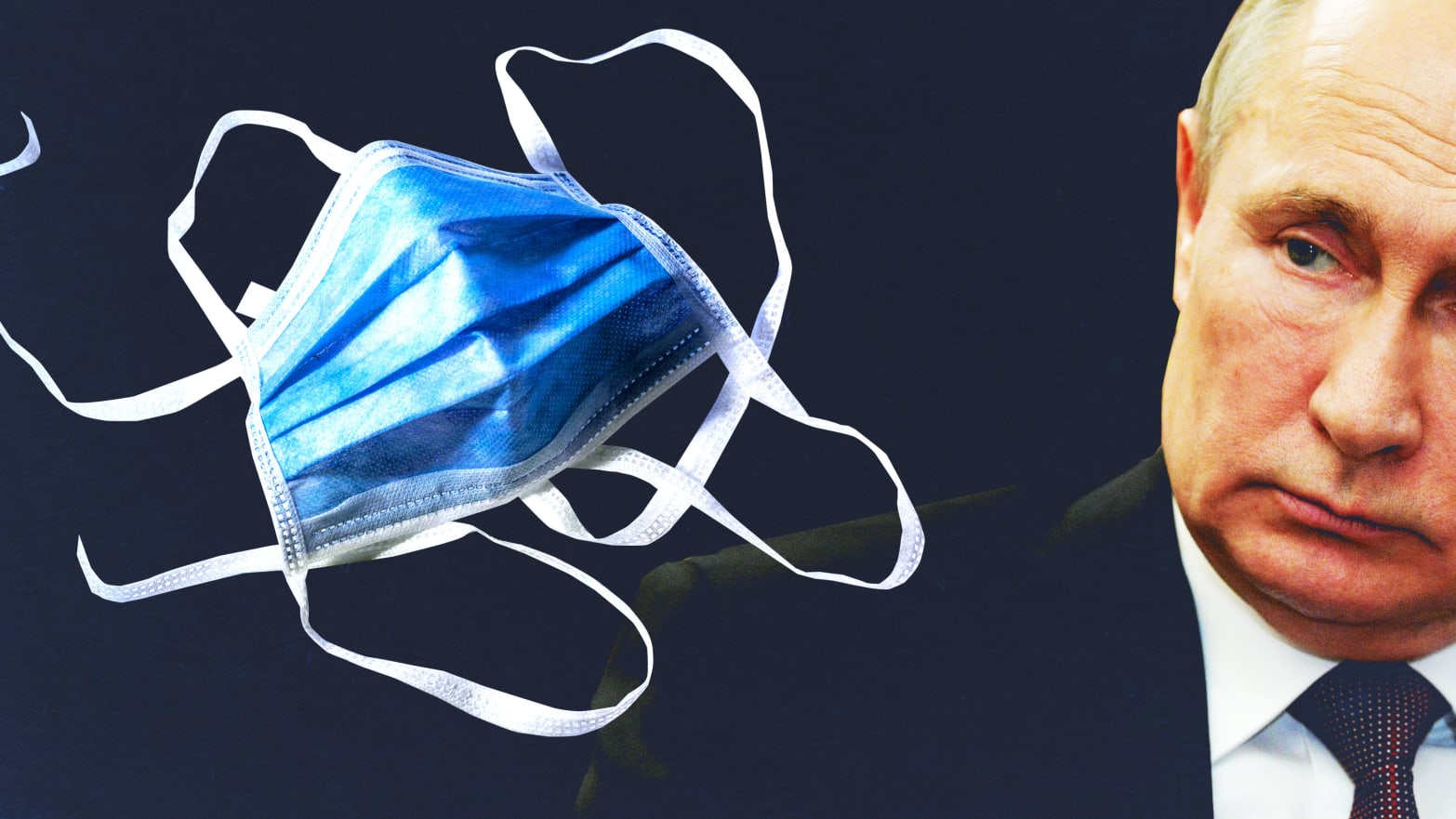As the world reels from the novel coronavirus pandemic, Russia is doing its best to turn global turmoil into propaganda fodder. To date, a country of 146 million people straddling Europe and Asia and that has a great deal of commerce with those two great epicenters of the disease reports only 438 confirmed coronavirus cases and no deaths. One previously disclosed fatality has been dismissed by authorities as attributable to other causes.
But according to official statistics from Russian state media, more than 52,000 people remain under medical supervision “in connection with suspected coronavirus infection.”
Perhaps the real number of Russia’s coronavirus patients lies somewhere in between.
Garry Kasparov, a world-renowned former world chess champion and the chairman of the Renew Democracy Initiative, told The Daily Beast why the Kremlin’s dubious claims shouldn’t be taken at face value:
“Of course Russia is lying about their coronavirus stats and I can say that confidently because they lie about everything,” said Kasparov. “Dictatorships lie when they have to—and when they don’t; it’s about control. Control of information, shaping reality, and, most importantly, appearing all-powerful and all-knowing. If the regime can be surprised or overwhelmed by a virus, maybe it’s not so powerful after all, a dangerous line of thought for a repressed population to have. Until there is truly independent testing—and the stories we’re hearing out of Russia are not encouraging—we just don’t know what’s going on.”
Even so, Western media outlets have disregarded the Kremlin’s less-than-sterling reputation for honesty and transparency, and lauded Russia’s self-proclaimed success in controlling the deadly virus.
In January, Fox News reported Russia’s decision to close its border with China and in early February uncritically repeated the claim that “Russia has only two confirmed cases of the virus, but authorities have taken measures to prevent its spread by hospitalizing people returning from China as a precaution.”
In late February, Fox News stated that “Russia only has three confirmed cases of the COVID-19 disease caused by the virus,” without questioning the probability of such fantastic statistics in light of a pandemic raging in neighboring China.
Last Sunday, showcasing Russia’s coronavirus aid to Italy, Fox News posted photographs released by the Russian Defense Ministry Press Service, with the doors of Russian military trucks adorned with heart-shaped flags that read: “From Russia with love.”
Apparently accepting Russia’s claims as ironclad facts, Fox News fawned: “Russia has so far reported very few confirmed coronavirus cases, noting just 306 infections and one death. As the U.S. and Europe struggle to contain the virus, nations once viewed as rivals are stepping up in the global coronavirus response.”
CNN wrote on Saturday that, “According to information released by Russian officials, [Russian President Vladimir] Putin’s strategy seems to have worked. The number of confirmed Russian coronavirus cases is surprisingly low, despite Russia sharing a lengthy border with China and recording its first case back in January.”
Kasparov, a persistent critic of Putin, wonders why anyone would believe this stuff, much less report it. “Repeating Russia’s numbers is ridiculous. Trust must be earned, and Putin lies about everything from his invasion of Ukraine to the more directly comparable epidemic of HIV in Russia that officially doesn’t exist. Why should Western governments and media treat Putin’s dictatorship in good faith when it’s not returned, and in fact is exploited?”
Russia’s alleged triumph over the coronavirus coincides with Putin’s maneuvers to become the country’s president for life, a role all but assured through pending constitutional changes. Amendments in question have already been approved by both houses of parliament and are now pending a nationwide vote on April 22, which will take place come rain or shine—coronavirus notwithstanding. The possibility of conducting the vote by mail is under consideration.
In the meantime, the Kremlin-controlled Russian state media are reminding citizens that the country’s very survival depends on Putin’s leadership. Dmitry Kiselyov, the host of Russia's most popular Sunday news program, Vesti Nedeli, is leading the way. “Let’s be honest,” he insisted this month: “Russia without Putin is non-viable.”
But there is ample evidence the regime’s information war is being disregarded by Russians in the trenches trying to deal with the reality of the disease. On Monday, Russian Prime Minister Mikhail Mishustin gave the authorities five days to develop a system that would track and notify people who have come in contact with any known carriers of coronavirus. The system would simultaneously notify special regional headquarters set up to fight the pandemic.
Authorities have begun building a 500-person hospital to house coronavirus patients near Moscow and Russian doctors reportedly are alarmed that some cases are being ascribed to pneumonia and seasonal flu without testing. The same state-media TV shows that would have you believe everything is under control are being filmed without audiences.
Everyday Russians are stocking up on astronomical quantities of toilet paper and buckwheat, disregarding the government’s assurances that coronavirus is being contained.
Margarita Simonyan, editor-in-chief of state media outlets RT and Sputnik, launched a Twitter initiative designed to prove that Russian grocery stores show no signs of panic buying. Simonyan’s idea backfired, as multiple citizens responded with photographs of emptied store shelves.
Lingering memories of Soviet-era coverups are exacerbated by more recent denials, such as Russia’s covert warfare in Ukraine, its role in the downing of the Malaysian aircraft MH17, clumsy denials of the Skripal poisonings, and obfuscation of crucial details about a radioactive explosion involving a nuclear-powered missile in northern Russia last year.
But the Kremlin’s persistent aim to keep the coronavirus numbers down is paying off thus far, since Russia’s international flights are unimpeded by worldwide bans. While U.S. President Donald Trump barred travelers from China, its largest neighbor continues to receive the benefit of the doubt.
“Just as China’s information crackdown led directly to the massive outbreak now threatening the world,” says Kasparov, “Putin’s will also have an impact across the Russian border. The radioactive cloud from Chernobyl poisoned much of Europe. The flights still coming out of Russia—not on the banned list because of the low official numbers—could spread disease all over the globe.”
Painting a rosy picture of Russia’s future, the Kremlin-controlled state media predicted doom and gloom for everybody but the motherland, especially the hated United States.
Last week, experts on The Evening With Vladimir Soloviev were crowing about economic troubles for the West. Russian economist Mikhail Khazin opined that Russia is the only region that can grow and prosper economically during the challenging times of the coronavirus pandemic. Other experts on the show suggested that America is withering as a superpower, while a new age is dawning for Russia and China. They concurred that “Soviet-like regimes are winning” and the new world will be more authoritarian.
Host Vladimir Soloviev concluded: “Enough talk about individual freedoms.” With angry animus, Soloviev argued that history would disprove the premise of Francis Fukuyama’s book The End of History and the Last Man and would lead to the uprooting of liberal democracies.
As he has in the past, Soloviev referred to President Trump as “Donald Ivanovych” and marveled at the statements and actions of the American leader, who is himself in the risk group for contracting coronavirus.
Still, Russian state TV pundits kept their usually sharp ridicule to the minimum. Their exchanges revealed the hope that Western sanctions imposed after the annexation of Crimea and other Putin abuses of international law would soon be lifted, with the coronavirus pandemic overshadowing all prior concerns.
Dmitry Kiselyov argued during this Sunday’s episode of Vesti Nedeli that multiple Western governments will be undergoing deep changes and the sanctions against Russia will soon become obsolete.
As for the short-term propaganda goals, the Kremlin still anticipates the arrival later this spring of U.S. National Security Adviser Robert O’Brien for Moscow’s big 75th anniversary celebration of victory over the Nazis. President Trump reportedly “wanted to go but faced pressure from advisers not to embark on such a journey.” The parade is scheduled for May 9—the very month the coronavirus epidemic is expected to have reached a peak in Russia.

